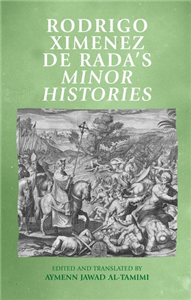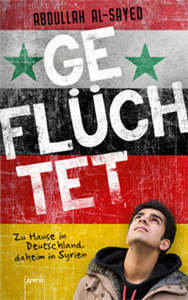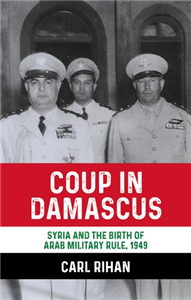Your Search Results
-
Promoted ContentHumanities & Social SciencesJanuary 2026
Rodrigo Ximenez de Rada’s Minor Histories
by Aymenn Al-Tamimi
This work provides the first complete English translation of works by Toledan archbishop Rodrigo Ximénez de Rada (1170-1247 CE), whose 'Minor Histories' are sequels to his larger 'Gothic History' and thus round off his grand history of Spain project that he began at the request of King Ferdinand III. The 'Minor Histories' include Rodrigo's 'History of the Arabs' that can be considered the first surviving Western monograph focused on Arab and Islamic history and thus occupies a unique position in the medieval Latin corpus of writings. In addition to the translation, this book provides a thorough and accessible introduction to the life and works of Rodrigo, making sense of the context in which he wrote and his historical method. The translations are thoroughly annotated including cross-references to other Latin and Arabic sources for comparison.
-
Promoted ContentBiography & True Stories
Der Pate von Berlin
Mein Weg, meine Familie, meine Regeln
by Al-Zein, Mahmoud
Mahmoud Al-Zein is the head of the Al-Zein clan, one ofthe most influential large families in GermanyStark, controversial, unsanitised: the brutal truth about violence,power and honour Arab clans rule Germany’s inner cities and are often in the headlines. One of the most influential of these large families is the Al-Zeins. Their family head, Mahmoud Al-Zein, is known as the notorious Godfather of Berlin. Now, he is the first to break his silence and to give a no-holds-barred account of the inner working of his family organisation: his journey to the top, conflicts with law, time in prison, feuds with rivals, the law of the family and the brutal fight for supremacy on the streets. An incomparable insight into Arab lansand a report on German day-to-day reality.
-
 Trusted Partner
September 2012
Trusted Partner
September 2012Excellence in Service und Administration
- Dienstleistungen optimieren - Kunden begeistern - Kosten reduzieren
by Al-Radhi, Mehdi; Diers, Sebastian
-
 Trusted Partner
July 2009
Trusted Partner
July 2009In der Wüste findet nur der Kluge den Weg
Gedichte. Edition Lyrik Kabinett
by Al Maktoum, Mohamed bin Rashid
-
 Trusted Partner
Trusted Partner
-
 Trusted Partner
January 1988
Trusted Partner
January 1988Al-Anon
Selbsthilfe für Angehörige von Alkoholkranken
by Neuendorff, Steffen L; Schiel, Jürgen
-
 Trusted Partner
February 2018
Trusted Partner
February 2018Geflüchtet. Zu Hause in Deutschland, daheim in Syrien
by Al-Sayed, Abdullah
Abdullah kommt aus Syrien. Er ist 16, als er aus seinem Heimatort Ar-Raqqa flieht. Sein älterer Bruder wurde verschleppt, sein Vater bei einem Bombenangriff getötet. Weil die Bedrohung immer größer wurde, stattete seine Familie ihn mit Geld aus. Abdullah schlug sich nach Deutschland durch. In einem Jugendheim findet er Sicherheit und ein neues Zuhause. Doch das Ankommen ist nicht leicht: Hautnah erlebt Abdullah, dass Flüchtlinge wie er als "Islamratten" beschimpft werden. Ständig spürt er misstrauische Blicke. Doch er bekommt auch immer wieder freundliche Hilfe, die ihm Hoffnung gibt. Hoffnung auf seine Zukunft in Deutschland, in einer Welt ohne Krieg.
-
 Trusted Partner
Trusted Partner
-
 Trusted Partner
Trusted Partner
-
 Trusted Partner
Humanities & Social SciencesJuly 2024
Trusted Partner
Humanities & Social SciencesJuly 2024Coup in Damascus
Husni al-Za'im and the birth of Syrian military rule
by Carl Rihan
Coup in Damascus is a history of Syria's first military regime. It plots the the fall of Syria's democracy and the rise of its military rulers, particularly Husni al-Zaim, whose brief rule in 1949 represented a profoundly transformative moment for the Syrian nation. It is a history of the thoughts, intentions and motives of political actors underpinning the events that have marked Syria's history after the first Arab-Israeli war, and focuses mainly on the interaction between local, regional and international actors. Unlike most histories of the modern Middle East that tackle broad intervals and that focus on the sequences of events, this history seeks to reconstruct the thought processes behind the events, and anchor them within the epoch's existing political and socioeconomic conditions. It draws on several methodological influences, particularly R.G. Collingwood's 'history as re-enactment of the past'.
-
 Trusted Partner
March 2006
Trusted Partner
March 2006Arabische Kalligraphie für Einsteiger
Alphabete, Anleitungen, Anwendungen
by Al Delaimi, Ghazi
-
 Trusted Partner
April 2013
Trusted Partner
April 2013Nicht ohne meine Mutter
Mein Vater entführte mich als ich ein Jahr alt war. Die Geschichte meiner Befreiung
by Al-Mer, Meral
-
 Trusted Partner
Trusted Partner
-
 Trusted Partner
May 2014
Trusted Partner
May 2014Araber als Teil der hellenistisch-römischen und christlichen Welt.
Wurzeln orientalistischer Betrachtung und gegenwärtiger Konflikte: von Alexander dem Großen bis zur islamischen Eroberung.
by Al-Ani, Ayad
-
 Trusted Partner
January 1993
Trusted Partner
January 1993Unbehagen in der Moderne
Aufklärung im Islam
by Azm, Sadik J al- / Arabisch Magdi, Chérifa
-
 Trusted Partner
March 2009
Trusted Partner
March 2009Entstellt
Sie erlebte einen Albtraum -. und wurde die mutigste Frau Saudi-Arabiens
by Al-Baz, Rania / Übersetzt von Landgrebe, Christiane
-
 Trusted Partner
June 1994
Trusted Partner
June 1994Wege zum Gleichgewicht
Ein Marshallplan für die Erde
by Gore, Al / Englisch Hörmann, Frank; Englisch Brumm, Walter
-
 Trusted Partner
Humanities & Social SciencesJune 2026
Trusted Partner
Humanities & Social SciencesJune 2026Romanticizing masculinity in Baathist Syria
by Rahaf Aldoughli
-
 Trusted Partner
Trusted Partner
-
 Trusted Partner
Trusted Partner




























